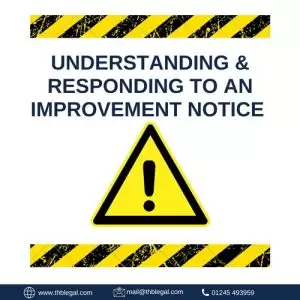Diversity Data for 2025
In accordance with SRA regulations we collect Diversity information, every two years, which is...- 04 July 2025
Posted: 13 June 2023
Receiving an improvement notice can be a cause for concern, as it indicates that a person or organisation is believed to be in contravention of statutory provisions, or has previously contravened such provisions, in line with Health and Safety at Work Act 1974.
This article aims to provide guidance on what an improvement notice entails, what steps should be taken, and how to appeal if necessary.

An improvement notice is a formal notice issued by an inspector when they believe that a contravention of statutory provisions has occurred or is likely to continue. It is a requirement to the recipient to make improvements in order to comply with relevant regulations.
The inspector’s belief that a contravention of regulation has occurred or is ongoing.
The specific statutory provisions that are considered to have been contravened.
The details of what needs to be done and who is responsible for remedying the contravention.
The timeframe within which the required improvements must be implemented. This period should be no less than 21 days from the date of receiving the notice, allowing for the possibility of appealing the notice to an employment tribunal.
Upon receiving an improvement notice, it is crucial to take immediate action. The notice becomes effective as soon as it is issued. Failing to comply with its requirements is an offense under Section 33(1)(g) of the Health and Safety at Work Act 1974, potentially leading to prosecution. Here are the recommended steps to follow:
The inspector who issued the notice should engage in a discussion with the duty holder regarding how the required improvements can be achieved. The inspector may provide additional guidance in a covering letter accompanying the notice, which should be seen as advice and not part of the notice itself.
Carefully review the improvement notice to understand the contraventions identified, the remedial actions required, and the compliance period provided. Seek clarification from the inspector if any aspects are unclear.
If you believe the improvement notice is unjust or incorrect, you have the right to appeal. Information on the appeal process should be provided alongside the improvement notice. To initiate an appeal, you must submit a claim to a tribunal office within 21 days from the date the notice was served. It’s important to act promptly, although the tribunal may consider a late appeal at its discretion.
When an appeal is lodged, the operation of the improvement notice is suspended until the appeal is heard or withdrawn, ensuring that you can focus on the appeal process without immediate enforcement actions.
Complying with an improvement notice is essential to avoid prosecution. However, if you believe the notice is erroneous, appealing is your right. Prompt action and seeking legal assistance, if necessary, are crucial in navigating the process effectively.
If you have received an improvement notice, are considering an appeal, or have any questions, we recommend contacting our specialist regulatory department at 01245 493959 or via email. Our team will be happy to assist you.
- 04 July 2025
- 30 June 2025
- 12 June 2025